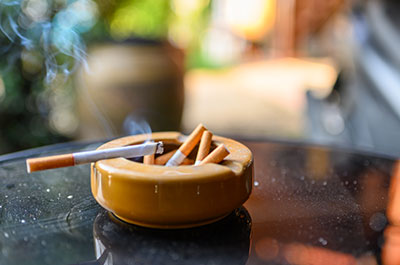Many years have passed since Michigan—and many other states and localities—passed laws requiring almost all public places to be smoke-free. But recently, “cigar bars” have been popping up in the state and across the country.
“The trend is concerning for public health experts,” says Amanda Holm, MPH, who manages the Tobacco Treatment Service at Henry Ford Health.
Here, Holm shares how cigar smoking affects health and how to reduce your risk.
Cigar Health Effects
The dangers of cigarettes are well known. Smoking is still the number one cause of preventable death and disease. It harms the body from head to toe, causing diseases like lung cancer and chronic obstructive pulmonary disease (COPD). Smoking also increases the risk of other cancers, heart disease and stroke, and can affect your immune system and even your mental health.
Those risks are similar for cigars, Holm says. And cigars can contain even more tar and give off more carbon monoxide than cigarettes.
Of course, cigarettes and cigars aren’t exactly the same. One big difference is that most cigar smokers don’t inhale cigar smoke. That doesn’t mean cigars are safe, however.
Tobacco smoke—from any source—contains more than 7,000 chemicals, according to the American Lung Association. At least 69 of them are known to cause cancer. Even if you aren’t inhaling deeply into your lungs, smoking cigars still raises the risk of oral cancers and throat cancers, Holm notes. And tobacco smoke contains many compounds that are likely to affect health in ways we still don’t fully understand.
Cigars and Secondhand Smoke
What’s more, the dangers of secondhand smoke are well established. Spending time in a smoky cigar bar means you’re in an enclosed space, breathing in all of those toxins. “And no amount of ventilation can prevent this,” Holm says.
Even brief exposure to secondhand smoke can cause health problems, including asthma attacks. It can increase the risk of heart disease, lung cancer and stroke. “The research is clear on the health effects of secondhand smoke,” she says.

Tobacco Treatment Service At Henry Ford Health
What if you only visit cigar bars once in a while? It’s true that the more you smoke, the greater the risks, but “there is no safe level of exposure to tobacco smoke,” Holm notes. The risks may be greater if you have asthma or underlying health problems like heart disease, she adds. And the risks are even more significant for cigar bar workers who are exposed to secondhand smoke on a regular basis.
There’s also the risk of becoming dependent on nicotine. “Like cigarette smokers, people who smoke cigars might notice cravings and withdrawal symptoms—even if they aren’t smoking every day,” Holm says.
Can Cigar Smoking Be Safe?
Tobacco use is never considered completely safe, Holm says. Still, if your friends are organizing a stogie night, you can take steps to lower the risks:
- Take it outside. Exposure to secondhand smoke is much greater in an enclosed space like a bar. Consider gathering outdoors with friends instead.
- Clean up. Residues of nicotine and other chemicals can stick around on your skin, hair and clothing, even after the smoke clears. Exposure to that “thirdhand smoke” could be harmful to children or pets. If you’ve spent time in a smoky space, shower and wash your clothes when you get home.
- Don’t drink and smoke. Using alcohol and tobacco together significantly increases the risk of oral cancers, Holm says. Don’t double up.
- Focus on flavor. Smoking dulls your taste buds and sense of smell. If you’re eating at a cigar bar and breathing in smoke, you won’t be able to fully appreciate the aromas and flavors of your meal. Ask whether your friends might like to meet at a nice restaurant instead.
- Suggest alternative get-togethers. Cigar bars aren’t the only place for a special night out. Try bowling, hiking, hitting the batting cages or planning a game night at home. Talk to your friends and get creative, Holm suggests. After all, fun with friends shouldn’t be a health hazard.
Reviewed by Amanda Holm, MPH, a senior project manager of the Tobacco Treatment Service at the Center for Health Promotion and Disease Prevention at Henry Ford Health.



